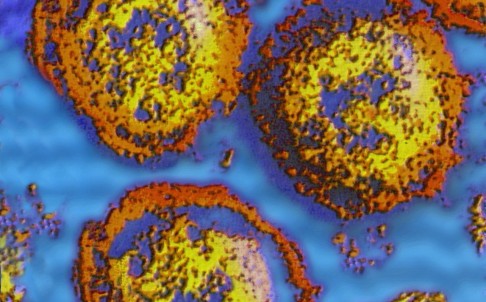Cheap smartphone device detects HIV and syphilis in 15 minutes
PUBLISHED : Thursday, 05 February, 2015, 10:42am
UPDATED : Thursday, 05 February, 2015, 2:07pm
Agence France-Presse

HIV under the microscope. Photo: Graphic News
US researchers have found a way to turn a common smartphone into a quick and easy device to conduct field tests for HIV and syphilis.
Using an attachment that costs US$34 to make -- a far cry from the standard $18,000 for diagnostic tests -- blood drops are tested for the diseases’ antibodies in minutes instead of hours, said the research led by Columbia University engineers.
When plugged into a smartphone’s audio jack, scientists said it mimicked the enzyme-linked immunosorbent assay (ELISA), a well-known test for HIV, and “performed almost as well.”
The initial study, involving 96 women in Rwanda, is published in the journal Science Translational Medicine.
Experts hope that this lab-on-a-chip device could be a helpful tool, especially in places where field clinics are set up to help remote or underserved populations.
The team, led by Samuel Sia, associate professor of biomedical engineering, is aiming for larger clinical trials first.
“Our work shows that a full laboratory-quality immunoassay can be run on a smartphone accessory,” said Sia.
“Coupling microfluidics with recent advances in consumer electronics can make certain lab-based diagnostics accessible to almost any population with access to smartphones. This kind of capability can transform how health care services are delivered around the world.”
To test its effectiveness, health care workers in Rwanda used the tool to do finger-prick blood tests on the 96 patients.
The team compared the results with standard enzyme-linked immunosorbent assay or ELISA testing, and found the results were nearly as accurate. The smartphone test has a sensitivity of 92 to 100 percent, a measurement of how often the tests accurately identified the target antibodies, and it had a specificity of 79 to 100 percent, an indicator of how well the test did at ruling out people who were not infected.
The researchers estimate that with syphilis, a test with only 70 to 80 percent sensitivity and specificity that was performed at the point of care could reduce deaths tenfold compared with a perfectly accurate lab-based test, because the non-lab test would be more likely to increase syphilis diagnosis.
The phone test yields results in 15 minutes, compared to At least two hours for the lab test.
The study was funded by a Saving Lives at Birth transition grant -- which is backed by the US Agency for International Development (USAID), Gates Foundation, government of Norway, Grand Challenges Canada, the World Bank and the Wallace H. Coulter Foundation.
Additional reporting by Reuters
